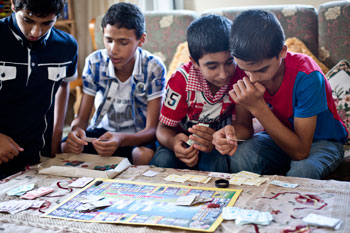SOS Children in Gaza Carry Unavoidable Fears - #putchildrenfirst

The children of the Gaza Strip and of Israel have grown up with the constant threat of violence and learned to live with it. But the tension and fear of the recent situation has been very difficult in the SOS Children’s Villages in the town of Rafah, 30 km south of Gaza City, and in the Israeli city of Arad, near the West Bank.
Samy Ajjour, an SOS coordinator in the Palestinian Territories, reports that recent times have been hard: “There has been a lot of shelling and bombing. No bombs landed directly on our Children’s Village; however, they have been within earshot. We have seen and felt the impact.” He adds that they are able to meet all of their essential needs, although there is a shortage of electricity and the Internet has been out. In late July, there was a lack of fuel, banks were closed, and no one went out shopping, since “it feels as though any moving body is a target.”
For that reason, and with the continual bombardment, workers at the SOS office could not come in, forcing the office to close. Nor could social workers or psychologists, and all outdoor children’s activities have been cancelled, just at the time when they are most urgently needed to alleviate the constant stress.
 The anxiety is felt as keenly on the other side of the border, in Arad. “The children in the village are okay, but they worry about their brothers and sisters and parents,” says the Arad SOS Village Director, Matti Rose. Many have relatives in areas that have been targeted in the past by rockets from Gaza.
The anxiety is felt as keenly on the other side of the border, in Arad. “The children in the village are okay, but they worry about their brothers and sisters and parents,” says the Arad SOS Village Director, Matti Rose. Many have relatives in areas that have been targeted in the past by rockets from Gaza.
Life in these cities are difficult enough even without the bombardment. Arad’s population includes many minority or high-risk groups: Ethiopian immigrants whose inability to speak or read Hebrew limits them to low-paid, menial jobs, and whose children have a high rate of drug and alcohol abuse; Negev Bedouins who have given up their nomadic lifestyle and settled in villages without electricity, running water, waste collection, or health care; large Haredi families whose fathers have no permanent jobs. In Gaza, 23% of the population is unemployed, 38% is below the poverty line, and 53% is under 18. Food is expensive, medical services are not always accessible, domestic violence is high, and people’s expectations for positive change are waning.
A spark of hope, though, is provided by the cooperation between the SOS Children’s Villages in Palestine and in Israel. SOS Israel had repeatedly warned top military authorities of the location of the SOS Children’s Villages programs in Gaza and the West Bank, giving them exact geographic coordinates in order to protect the families there from bombardment. According to Ajjour, SOS mothers tell their children “that the SOS Village is the safest place in the world so they do not need to worry.” Worry is impossible to avoid, though, for all those living in the war-torn regions.
For more of our Put Children First campaign, please follow our Twitter and Facebook. Keep others in the loop by using the hashtag #putchildrenfirst!
Canadian's wishing to support SOS Children's Villages are encouraged to sponsor a child, sponsor a village or to make a direct donation. Your support ensures that SOS Children's Villages can continue to provide a safe and loving home to orphan and abandoned children worldwide.
